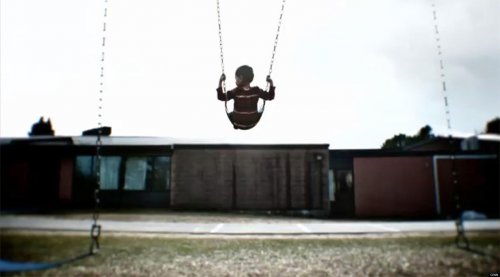The Emotional Imprint of an Absent Father


Written and verified by the psychopedagogue María José Roldán
There are people who believe that the relationship of children with their mothers is fundamental, but we must not lose sight of the fact that the relationship that children establish with their fathers from birth (and even from the moment they’re in the womb), will also condition their life. The father’s relationship with the children is also fundamental. Therefore, an absent father can leave an emotional mark that’s difficult to erase.
Research confirms it
A meta-analysis of the scientific evidence, carried out by the experts Abdul Khaleque and Ronald Rohner, concluded that a father’s love is as important as that of a mother, as both guarantee optimal emotional development in children.
According to the review carried out by Khaleque and Rohner, there’s an investigation that addressed more than 10,000 cases and revealed that a distant, cold, or absent father usually causes emotional wounds in the child, and leaves a mark that lasts a lifetime.
Specifically, the evidence showed that children who were raised without the presence of a father tend to develop low self-esteem and be more anxious, insecure, and/or aggressive–characteristics of their personality that could remain until adulthood and impair the optimal development of their social skills.
In addition, the review carried out by Khaleque and Rohner of 36 other studies from around the world allowed them to conclude that paternal love is key to development in general and the hope is that the results found will motivate men to become even more involved in the care of their children.
Mistaken beliefs that have persisted for centuries

In the United States, Britain, and Europe, the assumption has been that all children need a mother’s love for normal and healthy development… That fathers are there to support the mother, and that their only role is to provide for the family economically.
Therefore, it’s assumed that fathers aren’t absolutely necessary for healthy and balanced emotional development in children.
However, these beliefs, in addition to being wrong, are obsolete. Society needs to begin to move away from that idea and recognize the influence of the father figure and the importance of his role in the development of children.
There are many circumstances that exist in families, but both parents are essential for the mental health of children.
The imprint of an absent father on children
Children and adults around the world – regardless of race, culture, and gender – tend to respond in exactly the same way when they perceive themselves as rejected by others. Rejection in childhood has a strong and consistent effect on the personality and very negatively affects the development of boys and girls, opening an emotional wound within their being.
Therefore, when children have little or no contact with their father figure, they tend to develop some of the following problems:
- Difficulty establishing healthy interpersonal relationships.
- The constant fear that someone will hurt or reject them. This can cause them to develop dependent personalities toward authority figures or just the opposite, they may distrust everyone.
- Behavior problems. In this case, children and adolescents resort to rebellion to call attention to that absent or distant father
- Difficulty regulating and channeling one’s own emotions.
- Doubtful and indecisive personalities, which leads them to have difficulties in making decisions. This is especially due to the absence of a firm reference during childhood.
- Self-esteem problems and lack of self-confidence.
As we see, the love of a father is often as important as that of a mother. In some cases, it can be even more so.

Rejection in people
Research shows that the parts of the brain that are activated when people feel rejected are the same as when they are in physical pain.
But unlike physical pain, people can psychologically relive the emotional pain of rejection over and over again for years. Therefore, we shouldn’t underestimate the severe damage that rejection can cause in children.
Both the father and the mother must be committed to the upbringing and development of the children because both are fundamental pillars for the little ones. Emotional stability will depend on the emotional stability of both parents, and that’s why both the father and the mother must give unconditional love to their children and provide them with the best possible positive discipline and emotional education.
There are people who believe that the relationship of children with their mothers is fundamental, but we must not lose sight of the fact that the relationship that children establish with their fathers from birth (and even from the moment they’re in the womb), will also condition their life. The father’s relationship with the children is also fundamental. Therefore, an absent father can leave an emotional mark that’s difficult to erase.
Research confirms it
A meta-analysis of the scientific evidence, carried out by the experts Abdul Khaleque and Ronald Rohner, concluded that a father’s love is as important as that of a mother, as both guarantee optimal emotional development in children.
According to the review carried out by Khaleque and Rohner, there’s an investigation that addressed more than 10,000 cases and revealed that a distant, cold, or absent father usually causes emotional wounds in the child, and leaves a mark that lasts a lifetime.
Specifically, the evidence showed that children who were raised without the presence of a father tend to develop low self-esteem and be more anxious, insecure, and/or aggressive–characteristics of their personality that could remain until adulthood and impair the optimal development of their social skills.
In addition, the review carried out by Khaleque and Rohner of 36 other studies from around the world allowed them to conclude that paternal love is key to development in general and the hope is that the results found will motivate men to become even more involved in the care of their children.
Mistaken beliefs that have persisted for centuries

In the United States, Britain, and Europe, the assumption has been that all children need a mother’s love for normal and healthy development… That fathers are there to support the mother, and that their only role is to provide for the family economically.
Therefore, it’s assumed that fathers aren’t absolutely necessary for healthy and balanced emotional development in children.
However, these beliefs, in addition to being wrong, are obsolete. Society needs to begin to move away from that idea and recognize the influence of the father figure and the importance of his role in the development of children.
There are many circumstances that exist in families, but both parents are essential for the mental health of children.
The imprint of an absent father on children
Children and adults around the world – regardless of race, culture, and gender – tend to respond in exactly the same way when they perceive themselves as rejected by others. Rejection in childhood has a strong and consistent effect on the personality and very negatively affects the development of boys and girls, opening an emotional wound within their being.
Therefore, when children have little or no contact with their father figure, they tend to develop some of the following problems:
- Difficulty establishing healthy interpersonal relationships.
- The constant fear that someone will hurt or reject them. This can cause them to develop dependent personalities toward authority figures or just the opposite, they may distrust everyone.
- Behavior problems. In this case, children and adolescents resort to rebellion to call attention to that absent or distant father
- Difficulty regulating and channeling one’s own emotions.
- Doubtful and indecisive personalities, which leads them to have difficulties in making decisions. This is especially due to the absence of a firm reference during childhood.
- Self-esteem problems and lack of self-confidence.
As we see, the love of a father is often as important as that of a mother. In some cases, it can be even more so.

Rejection in people
Research shows that the parts of the brain that are activated when people feel rejected are the same as when they are in physical pain.
But unlike physical pain, people can psychologically relive the emotional pain of rejection over and over again for years. Therefore, we shouldn’t underestimate the severe damage that rejection can cause in children.
Both the father and the mother must be committed to the upbringing and development of the children because both are fundamental pillars for the little ones. Emotional stability will depend on the emotional stability of both parents, and that’s why both the father and the mother must give unconditional love to their children and provide them with the best possible positive discipline and emotional education.
All cited sources were thoroughly reviewed by our team to ensure their quality, reliability, currency, and validity. The bibliography of this article was considered reliable and of academic or scientific accuracy.
- Khaleque A y Ronald Rohner (2012). Transnational Relations Between Perceived Parental Acceptance and Personality Dispositions of Children and Adults: A Meta-Analytic Review. Personality and Social Psychology Review, 16. Recuperado de: https://journals.sagepub.com/doi/abs/10.1177/1088868311418986
- Rodríguez Martínez, N. C. (2010). Los efectos de la ausencia paterna en el vínculo con la madre y la pareja (Master’s thesis, Facultad de Psicología). https://repository.javeriana.edu.co/handle/10554/1281
- Cartuche Cajamarca, Z. X., & Cacay Cacay, M. C. (2009). La ausencia de la figura paterna o materna y su incidencia en el comportamiento socio-afectivo de niños y niñas de primer año de educación básica de la escuela ‘18 de Noviembre’ y Jardín de Infantes ‘José Miguel García Moreno’, de la ciudad de Loja, periodo 2008–2009” (Bachelor’s thesis). https://dspace.unl.edu.ec/jspui/bitstream/123456789/3443/1/CARTUCHE%20ZOILA%20-%20CACAY%20MAYRA.pdf
- Gordon Coca, M. G. (2013). La ausencia de la figura paterna y su influencia en el desarrollo emocional de los niños/as de pre kinder del centro de estimulación y desarrollo infantil bilingüe gymbore garden de la ciudad de Ambato en el periodo trimestral enero marzo 2011 (Bachelor’s thesis). https://repositorio.uta.edu.ec/handle/123456789/3968
This text is provided for informational purposes only and does not replace consultation with a professional. If in doubt, consult your specialist.








